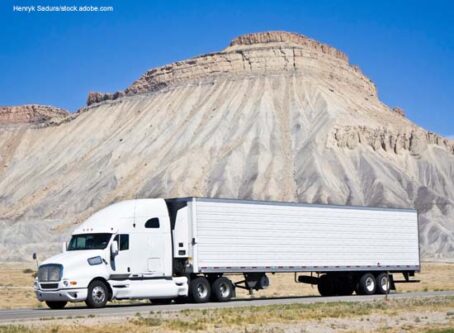Universal Logistics illegally fired truckers for unionizing
A National Labor Relations Board judge has ordered Universal Logistics companies to reinstate and award back pay to truckers it fired upon learning they were going to unionize.
On Oct. 19, Administrative Judge Michael Rosas ordered Universal Intermodal Services, Southern Counties Express, Roadrunner Intermodal Services and Universal Truckload to reinstate truckers that were fired after voting to unionize in 2019. Truckers will also receive back pay with interest. All companies are owned by Warren, Mich.-based Universal Logistics Holdings.
The decision stems from seven consolidated cases filed by the International Brotherhood of Teamsters that allege the companies violated the National Labor Relations Act. According to the decision, the complaints allege various coercive actions taken by the companies leading up to the vote, including interrogation, solicitation of complaints, promised terms and conditions of employment and the termination of two employees who led the organizing effort.
After employee drivers voted to unionize, the complaints claim the companies unlawfully reduced their work, closed Universal Intermodal’s facility in Compton, Calif., laid off the drivers without notification to or bargaining with the union, and laid off Universal Trucking and Railroad drivers as well. Furthermore, the companies are accused of refusing to bargain with the union over the Compton facility closure.
Universal Logistics has denied all of the allegations, claiming that all actions had legitimate business purposes.
Efforts to unionize began in the late summer and early fall of 2019. The campaign took place at the Compton and Slover, Calif., facilities. By Nov. 8, 2019, the union would file a petition to represent more than two dozen Universal Intermodal drivers. Pro-union tents were set up outside both facilities. Universal Truckload drivers shared the Slover facility. Just down the road drivers for Roadrunner caught wind of the union discussions and began to hop on board.
Driver terminations
On Nov. 12, 2019, Universal Intermodal hired labor consultant Kirk Cummings. Some drivers described Cummings as a “union buster,” according to the decision. Cummings conducted several meetings with drivers, conveying an anti-union message.
During the union campaign, the Compton facility was notified of an upcoming inspection by the California Highway Patrol. Johnathan Ledesma, one of the leaders of the union efforts, was approached by management regarding his out-of-state Arizona CDL. Ledesma was told he was required to have a California CDL. However, the driver said he was never informed of this and that he should be allowed a few days to reinstate his California CDL. Before he had a chance to reinstate his California CDL, Ledesma was fired for violating federal licensing requirements.
Although Universal Intermodal passed the inspection, there is no indication that the inspection included looking into driver records. Despite Ledesma reinstating his California CDL, his employment was never reinstated.
Romel Mallard was another Universal Intermodal driver who was outspoken of his support for unionizing. He had walked out of a Nov. 25, 2019, meeting when told to quit talking while deriding Cummings. Mallard was fired the next day for subordination. No further explanation was given.
On Dec. 4, 2019, a majority of drivers voted to be represented by the union.
On Jan. 8, 2020, the union was certified as the exclusive collective-bargaining representative.
Shortly after, Universal Intermodal decided to close the Compton facility and lay off employee drivers. Within two weeks of the final vote, drivers’ total hours were cut in half. On Dec. 16, Compton drivers were informed that the facility would close Dec. 31. Their final paycheck was enclosed in the notice. Layoffs of Universal Truckload and Roadrunner drivers soon followed. Drivers were told they would be rehired if they bought their own trucks and signed on as owner-operators.
In the weeks to follow, the trucking companies posted job openings for company drivers at a facility about 4 miles from the Compton facility. However, none of the laid off drivers were offered those opportunities.
In January 2018, the union accused Universal Intermodal of acting unlawfully and demanded it bargain. Representatives for the company refused to comply with the union’s request for information, citing various reasons ranging from requests being irrelevant to information being confidential or unavailable.
During a March 2020 meeting between Universal Intermodal and the union, the trucking company said the closure and layoffs were not attributable to labor costs but rather the shift to owner-operators and a downward flow of freight. It also continued to refuse to acknowledge the union as the drivers’ bargaining representative.
Union complaint prevails
In the decision document, the National Labor Relations Board agreed with most of the union’s claims.
To start, the board found that by Cummings asking employees how they felt about unionization, he violated labor codes dealing with unlawful interrogations. Second, Universal Intermodal illegally solicited grievances and promised to remedy those grievances.
There is nothing unlawful about addressing grievances if the company has a history of doing so. However, Universal Intermodal never addressed the drivers’ grievances until it was faced with the threat of unionization. By doing so, the National Labor Relations Board deemed the act as an attempt to invalidate the need for a union, which is illegal.
Additionally, the board found a causal relationship between the terminations of Ledesma and Mallard and their protected activity of unionizing. Furthermore, the labor board found the closure of the Compton facility and the subsequent layoffs were unlawful. Despite the fact that Universal Intermodal was thinking about closing the facility and moving to owner-operators, the board ruled that the evidence does not show that those actions would have taken place when they did, which is two days after the drivers voted to unionize. That decision was partly based on the fact that the company was looking for company drivers shortly after the layoffs. LL









